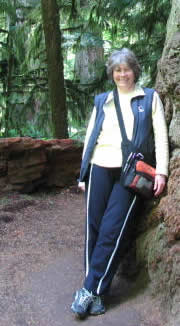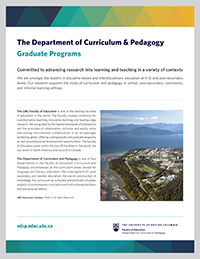On and Off-Campus
The Department of Curriculum and Pedagogy is one of four departments in the Faculty of Education at the University of British Columbia. Curriculum and Pedagogy encompasses all the curriculum areas, with the exception of language and literacy education. Inquiry in Curriculum and Pedagogy is disciplinary and interdisciplinary, and includes numerous theoretical perspectives and orientations. Faculty and graduate students investigate teacher education, the social construction of knowledge, the curriculum as culturally and politically situated, analysis of contemporary curriculum and instructional practices, and educational reform in K–12 and other learning environments.
Doctoral students enroll in the Curriculum Studies program, which includes course-work, comprehensive examinations, and a dissertation, with the assistance of a supervisor in their area of specialization. Master’s students may apply to any of the programs listed here: art, business, home economics, mathematics, museum education, music, physical education, social studies, science, and technology. As well, students may develop interdisciplinary programs in curriculum theory & design; teacher education; complexity science & education; digital media & learning technologies; scholarship of curriculum & pedagogy in higher education; studies in historical consciousness; museum & visitor education; and health, nutrition & sustainability education. Students with particular interests in teacher education and the scholarship of teaching in higher education (SoTL) research typically apply to the curriculum studies specialization in the Department.
Click to download flyer for EDCP graduate programs.
The Department offers the following graduate degrees:
Doctor of Philosophy (PhD)
Master of Arts (MA)
Master of Education (MEd)
Master of Museum Education (MMEd)

Current PhD student Trudy Bergere is doing primary research on how arts students cope with high-school science classes.
Programs and Specializations
Learn more about the program choices available to you as a graduate student.
Off-Campus External Cohorts & Institute
The Department is committed to offering excellent graduate programs, both on-campus and off-campus. In addition to our on-campus doctoral and master’s programs, we offer institutes and off-campus or external MEd programs in Vancouver, the Lower Mainland, and other regions of the province. For information on our off-campus cohorts, please see the Office of Professional Development & Community Engagement (PDCE) and the Department’s off-campus cohorts and institutes .
Accreditation and Academic Oversight
The University of British Columbia is a member of the Association of Universities and Colleges of Canada . Incorporated in 1908 by an act of the provincial legislature, UBC operates under the authority of the University Act of the Province of British Columbia. Membership in AUCC and operation under the authority of the University Act is equivalent to accreditation in the US system.
Faculty members exercise professional judgment in determining the curriculum design, course content, and sequence of courses based on disciplinary standards, expected learning outcomes, or other factors as appropriate. Specific procedures for implementing and evaluating the curriculum are determined by faculty members within the Department and designated colleagues at the Faculty level (e.g., associate deans and/or advisory committees). Substantive changes for programs are approved through the University’s Graduate Council and Senate .
Graduate programs within the Department are recognized by the British Columbia Teacher Qualification Service .
